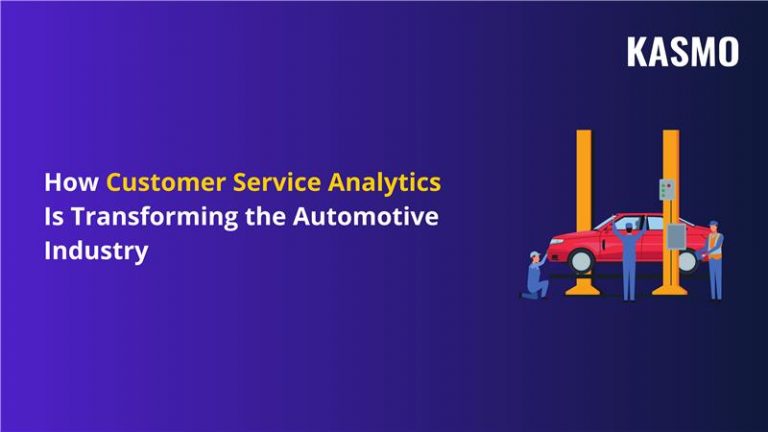Role of Customer Service Analytics in The Automotive Industry
According to McKinsey, “almost 60 percent of potential car buyers under 45 prefer to purchase their vehicle online.” This has led to automotive businesses taking a proactive approach towards customer service. With customer service analytics, automotive companies make smarter decisions, enhance service delivery, and elevate customer satisfaction and loyalty.
Customer service analytics involves examining data from various service interactions, such as phone calls, emails, social media, and customer surveys, to uncover actionable insights. This data is typically divided into two types:
- Quantitative data (e.g., average wait times, resolution duration, service channels used)
- Qualitative data (e.g., customer sentiment, complaints, product feedback)
Together, these insights help automotive companies conduct predictive customer analytics, that helps in providing a clearer understanding of customer needs and expectations. In the automotive industry, where buying journeys are getting increasingly digital and online, understanding your customers is very crucial.
By leveraging predictive customer analytics, automotive brands can anticipate customer challenges before they escalate, streamline service operations, and even identify opportunities for innovation, such as subscription-based services or AI-powered virtual assistants. Furthermore, solutions like Salesforce Service Intelligence, which includes Data Cloud, CRM Analytics, and Einstein Conversation Mining, make it easier for service teams transform raw data into actionable insights, improving customer engagement and reducing operational costs.
However, despite the growing importance of data, many automotive companies struggle to become truly data driven. By adopting advanced analytics, traditional OEMs can move beyond legacy models and begin delivering the kind of personalized, efficient service that defines the future of mobility. Customer service analytics helps improve customer loyalty in the automotive industry. As vehicles become smarter, automotive businesses also need to support and delight the customers who drive them.
Different Types of Customer Service Analytics That Can Be Used in Automotive Industry
To meet the rising customer expectations, automotive businesses must go beyond traditional service models and adopt data-driven strategies. Customer service analytics plays a vital role in this shift, and understanding the different types of analytics is key to unlocking smarter, faster, and more personalized experiences. In the automotive industry, various forms of analytics can be applied across service operations, from understanding historical trends to proactively resolving future challenges. Here’s a breakdown of the main types:
Descriptive Analytics
Descriptive analytics examine past service interactions to reveal what happened. This is particularly useful in automotive customer service for identifying recurring issues, evaluating agent performance, or tracking metrics like average handle time and channel usage. For instance, you can analyze omnichannel service data, such as call logs, emails, and chat interactions to assess how customers engaged with your brand post service.
Diagnostic Analytics
Diagnostic analytics help automotive businesses understand that high wait times were caused by insufficiently trained agents on a specific channel, or that certain service centers had unusually long handling times due to a lack of parts availability. These insights help service managers identify root causes and refine internal processes.
Predictive Analytics
Predictive customer analytics leverages AI, statistical algorithms, and machine learning to forecast future service outcomes based on historical data. For example, dealerships can anticipate service center footfall during peak seasons or predict common issues in newly launched car models based on past patterns.
Prescriptive Analytics
Prescriptive analytics goes one step further by recommending specific actions based on predictive insights. This is where Agentforce comes in. AI agents help guide service reps with real-time suggestions on how to resolve issues or which follow-ups to prioritize. Additionally, AI agents also recommend maintenance schedules for EVs based on usage patterns or prompt human agents to offer specific solutions to recurring issues.
How Customer Service Analytics Can Be Enhanced with AI in Automotive Industry
Artificial Intelligence increases the power of customer service analytics by unifying vehicle purchase histories, digital engagements, and service records on a single unified platform. When this data is unified across platforms, AI agents or AI-powered tools or solutions can analyze this data in real time to deliver intelligent, actionable insights.
For example, AI agents can read through customer service call transcripts, detect sentiment, and automatically categorize queries by topic and urgency. This not only speeds up resolution times but also improves the quality of service by providing tailored responses. For automotive customer service practices, AI can analyze connected vehicle data, customer preferences, and past complaints to deliver hyper-personalized experiences that boost trust and satisfaction.
As data volumes continue to grow, automotive companies must ensure they have robust systems in place to manage and analyze this data efficiently. This analysis of data helps automotive companies provide faster responses and high-quality service that meets the demands of today’s automotive customers.
How Automotive Industry Can Benefit from Customer Service Analytics
Leveraging customer service analytics can help automotive businesses transform customer service. By harnessing the power of data, automotive companies can unlock a range of benefits that drive growth, loyalty, and long-term success.
Enhancing Customer Experience
Auto buyers expect seamless, real-time service across channels, whether they’re scheduling a test drive online or resolving issues with their connected vehicles. With analytics in customer service, automotive companies gain a clear understanding of customer expectations and satisfaction levels. This enables brands to personalize interactions, resolve issues proactively, and foster trust. According to Salesforce research 94% of customers are more likely to make repeat purchases after a good service experience. This showcases the importance of conducting analytics in customer service to enhance customer loyalty.
Identifying Pain Points
Customer insights and analytics help automotive businesses uncover the root causes behind negative customer experiences. By analyzing service logs, feedback, and complaints, manufacturers and dealerships can identify recurring issues, such as long wait times, confusing processes, or technical glitches, and take corrective actions. For example, if predictive analytics reveals high service delays in a specific region, the company can reallocate staff or streamline appointment systems to improve efficiency.
Improving Operational Efficiency
Balancing speed and quality are a top challenge for service agents, especially in high-volume automotive service centers. Customer service analytics provide real-time data on service times, channel usage, and issue resolution metrics, enabling better workforce planning and resource allocation. These insights help streamline operations, reduce bottlenecks, and deliver faster, higher-quality service.
Facilitating Smarter Product and Service Development
Automotive businesses can also use customer service analytics to inform future innovation. By understanding which features customers love or frequently complain about, companies can refine existing products or develop new offerings that resonate with their audience. For instance, data from connected car sensors and customer surveys might suggest that customers are looking for better in-app navigation or faster charging options in EV models.
Boosting Customer Retention and Loyalty
One of the most valuable benefits of predictive customer analytics is its ability to forecast customer behavior. These insights enable brands to tailor loyalty programs, send personalized offers, and intervene at the right time to prevent churn. Automotive businesses can notify owners of upcoming maintenance, offer exclusive post-sale perks, or customize follow-up communications based on vehicle usage patterns.
Turning Data into Competitive Advantage
Automotive OEMs (Original Equipment Manufacturers) are overwhelmed with huge volumes of data, from in-car sensors and dealership interactions to digital touchpoints like apps and online portals. However, this data often remains siloed, making it difficult to derive meaningful insights. Many automotive companies are now shifting to direct-to-consumer models, which allows them to capture, own, and leverage customer data more effectively.
With a unified platform like Salesforce CRM, OEMs can unlock real-time insights that power everything from sales to after-service. For example, customer service analytics can reveal that simplifying the product portfolio can significantly boost satisfaction and offering online after-sales appointments will increase customer engagement.
Leveraging analytics in customer service also enables automotive businesses to continuously refine their customer journey. Instead of asking, “How did we do?” companies can now ask, “How can we exceed expectations right now?” This shift from reactive to proactive service enables automotive businesses to tackle increasing customer demand and strengthen loyalty.
How Salesforce Agentforce Help Automotive Businesses Enhance Customer Service
Salesforce’s Agentforce for Service empowers automotive brands to meet rising customer expectations while reducing operational complexity and cost. With Agentforce, automotive companies can scale effortlessly by fostering seamless collaboration between humans and AI agents across every touchpoint. This platform ensures that customer service analytics drive smarter decisions and deliver faster, personalized solutions across all channels.
Always-On Support With AI-Powered Agents
Agentforce enables autonomous service agents that can operate 24/7 across web, mobile, chat, and voice. These AI agents are trained to respond using conversational language tailored to your brand voice, ensuring high-quality customer interactions even during peak times. For automotive businesses, this means instantly addressing queries about vehicle features, maintenance schedules, warranty coverage, or appointment bookings without requiring any additional hiring.
Human-AI Collaboration for High-Touch Experiences
While Agentforce handles routine and administrative tasks, it also empowers human agents to focus on complex, high-value interactions. Whether resolving vehicle recalls or providing personalized financing assistance, service agents are supported with AI-generated case insights, real-time recommendations, and customer sentiment tracking. This predictive customer analytics approach helps teams resolve cases faster and with greater accuracy.
Intelligent Service Automation and Cost Reduction
Automotive brands using Agentforce can automate repetitive workflows, accelerate issue resolution, and cut support costs. From AI-driven case classification and routing to automated follow-ups, every step is optimized to improve operational efficiency and customer satisfaction.
A 360° View of Every Customer
With Salesforce’s Data Cloud and Customer 360 capabilities, Agentforce connects data across vehicle ownership, purchase history, service interactions, and digital behavior. This enables hyper-personalized support, predictive maintenance offers, and intelligent upselling—all driven by customer insight and analytics.
Imagine being able to proactively alert a customer about tire replacement based on usage data or sending a service reminder after detecting unusual vehicle behavior. These kinds of predictive, data-driven interactions help strengthen customer loyalty in the automotive industry.
Conclusion
As the automotive industry accelerates into a digital-first future, customer service analytics have become a critical enabler of long-term growth, efficiency, and loyalty. From enhancing service operations with predictive customer analytics to uncovering deep customer insight and analytics across every touchpoint, data-driven decision-making is transforming how brands engage with today’s connected car buyers.
Salesforce’s Agentforce for Service is revolutionizing automotive customer service and empowering brands to deliver personalized, always-on support while reducing operational costs. By unifying human expertise with AI-powered automation, automotive companies can streamline service delivery, anticipate customer needs, and boost satisfaction across channels.



